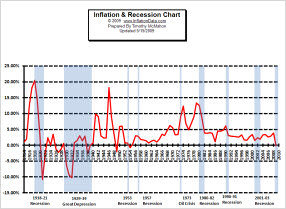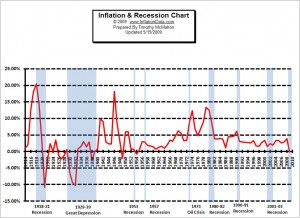By Tim McMahon, Editor Deflation has cropped up at various times throughout the nineteenth and twentieth centuries. Overall since 1913 when the Bureau of Labor Statistics began tracking inflation we have had 22 years that had one or more months when the annual inflation rate was negative (i.e. deflation). Most of those are clumped into larger deflationary periods. The six major deflationary periods are: January 1921 - February 1923 26 months July 1924 - November 1924 5 months July 1926 - November 1933 7 ½ years (with only 5 positive months and 5 zero inflation months.) March 1938 - January 1940 18 months May 1949 - June 1950 … [Read more...]
What is so bad about Trade Protectionism?
By Tim McMahon "As the bill moved through Congress, formal protests from foreign countries flooded into Washington, eventually adding up to 200 pages. Both houses voted aye nonetheless. While the legislation sat on the President's desk, 1,028 American economists called for a veto. Herbert Hoover made it the law of the land anyway, swallowing his own reservations and, on June 17, signing the Tariff Act of 1930".-- Time Magazine You may have heard of Smoot-Hawley and not have a clue what language they are speaking. According to Wikipedia, The Smoot-Hawley Tariff Act was an act signed into law on June 17, 1930, that raised U.S. tariffs on over 20,000 imported goods to record levels. … [Read more...]
Zimbabwe-hyperinflation-and-the-u-s-dollar (moved)
This page has moved if you are not redirected please click here: http://inflationdata.com/articles/2009/02/26/zimbabwe-hyperinflation-us-dollar/ … [Read more...]
What is so bad about Deflation?
By Tim McMahon The average annual inflation rate dropped again this month. At a monthly rate of -1.01% October's drop was touted as "the largest monthly drop on a seasonally adjusted basis since 1947 when the Bureau of Labor Statistics first started tracking seasonal adjustments" and it brought the annual inflation rate off its highs and down to a more reasonable 3.66%. November's monthly rate was almost twice as large at but it was hardly mentioned in the news. This month the annual inflation rate has dropped down virtually zero-- 0.09% with a monthly drop slightly larger than the one two months ago. Just a few months ago the annual inflation rate was 5.6% and now it is … [Read more...]
Deflation or Hyperinflation?
By Tim McMahon, Editor The monthly inflation rate dropped like a rock for the second month in a row. Journalists touted last month's drop as "the largest monthly drop on a seasonally adjusted basis since 1947 when the Bureau of Labor Statistics first started tracking seasonal adjustments". What are they going to say this month when it is almost twice as large? Largest drop since last month? This is real live deflation on a monthly basis (although not on an annual basis... yet). Basically, deflation is falling prices (or more accurately a decrease in the money supply that results in falling prices) while disinflation is a slowing of the rate of increase in prices. Are we in a … [Read more...]
Stagflation – What is it?
What is Stagflation? The simple definition of Stagflation is a "stagnant economy coupled with price inflation". Thus the term Stagflation... it has nothing to do with Deer. In other words, in stagflation prices are going up while the economy is going down. The word was coined during the inflationary period of the 1970's. Under normal conditions one would expect inflation to heat up the economy i.e. increase buying demand. That is one reason the FED generally increases interest rates during periods of higher inflation. This helps to cool the economy and prevent inflation from spiraling out of control. Of course ,if you have read other articles on this site, you will know that … [Read more...]
Disinflation – What is it?
Definition of Disinflation By Tim McMahon To fully understand disinflation we need to first understand inflation. The reasons this is trickier than it first appears is because the word inflation is actually used in two different contexts. The most common usage of the word inflation means rising prices. Commonly "consumer prices" so when you go to the gas station or the grocery store and the things you buy cost more than last month (or when it is really bad even more than last week) this is more precisely defined as "price inflation". The second meaning of the word inflation is actually the original meaning. And that is an increase in the money supply that causes "price … [Read more...]
Will the $800 Billion Bailout Cause Massive Inflation?
Last month I said that the simulated M3 measure of the money supply was indicating that deflation was in the works. See M3 is Back and Predicting Deflation. So how will a massive injection of almost $1 Trillion dollars affect the money supply? If you have read any of the articles on inflation on this site you will realize that the primary cause of price inflation is monetary inflation. In other words, if the government cranks up the printing presses the price of almost everything goes up. For more information see What is Inflation? and Inflation Cause and Effects. So you would think that it is only obvious that a massive injection of money like the recent $800 Billion bailout … [Read more...]
Why would Gold fall during an Investment Crisis?
Editor's Note-- In the article Is Gold really a good Inflation Hedge? I said, Gold is actually a "crisis hedge." So it should be performing extremely well with all the uncertainty in the markets right now. In this article Andrew Gordon explains how gold is currently in limited supply and demand is booming due to the crisis and what is currently affecting the price. -- Tim McMahon, editor Has Gold Lost its Investment Luster? By Andrew Gordon Gold dropped from $915 to $859 on Friday [October 10, 2008]. That’s not supposed to happen while the market is crashing. What’s going on? … [Read more...]
Inflation and Recession Chart
How does Inflation and recession correlate? Current Commentary Does high inflation correspond with a recession? Or does high inflation precede a recession? This chart shows the historical average Annual Inflation rate (red line) compared to the time periods where the country was in recession (blue shaded areas). Since 1914 there have been eight recessions. Three lasted for a single year, (in 1953, 1957 and again in 1990). The longest recession was actually the "Great Depression" which lasted ten years from 1929 to 1939. … [Read more...]




